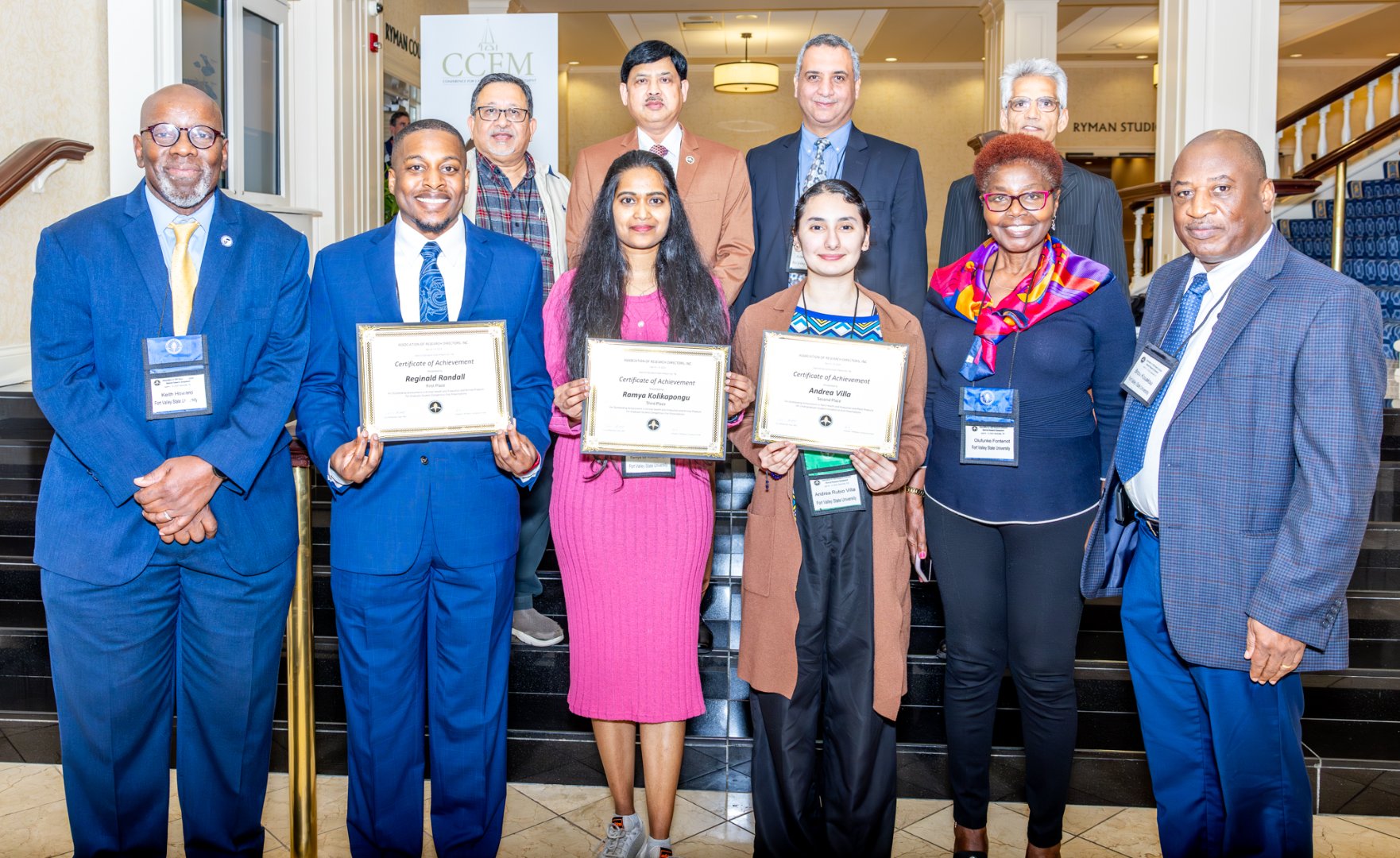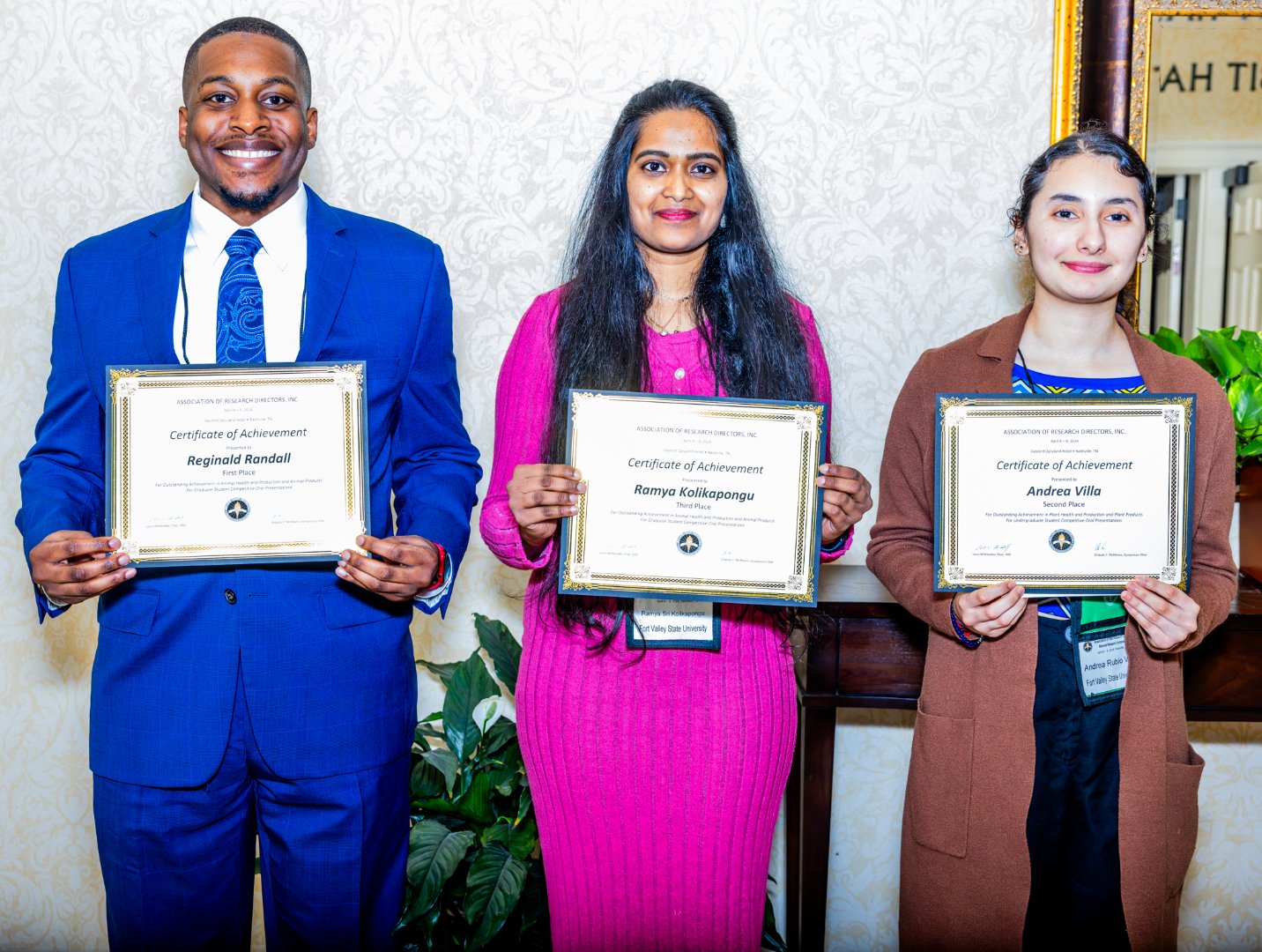The recent 21st Research Symposium of the Association of 1890 Research Directors (ARD) had record attendance with more than 1,500 people, including a host of Fort Valley State University (FVSU) students, faculty and staff. Several participated in oral and poster presentations, with three FVSU emerging student scientists earning awards.
The goal of the biennial symposium is to provide a forum for interactions, knowledge sharing, building networks for expanded partnerships and to showcase the talents and achievements of the 1890 land-grant community. This year’s conference was held in April at the Gaylord Opryland Resort and Convention Center in Nashville, Tennessee. The theme focused on “Climate, Health and Cultivating the Next Generation of Agriculture Leaders: Creating Solutions in Food, Agriculture and Natural Resources.”
FVSU students Reginald Randall, Andrea Rubio Villa and Ramya Sri Kolikapongu took home top honors for their oral presentations.
Randall, an animal science graduate student, won first place in the Animal Health and Production and Animal Products category. The 25-year-old presented on the advancement of anemia detection in small ruminants (goats and sheep) using convolutional neural networks (CNN).
“CNN is a type of artificial intelligence (AI) that’s able to identify anemia levels by analyzing images of eye conjunctiva from small ruminants,” he explained.
He said the goal is to produce a smartphone application that will help farmers detect anemia in small ruminants in a quick, accurate and easy way.
With former experience presenting at the ARD symposium, Randall said he enjoys engaging with new peers and learning more about their research. In addition, he is grateful for receiving an award.
“A lot of hard work has gone into this research, not only from me but from my advisers and teammates who helped me pursue and finish this project. Without their help, I don’t know how I would have finished it,” he expressed.
The Jefferson City, Missouri, native is interested in working in the medical field. He plans to pursue a doctorate in biology or animal science in the future.

Similarly, Kolikapongu won third place in the same category as Randall. The animal science graduate student said earning an award is a tremendous honor.
“This recognition serves as a testament to the significance and impact of the work I’ve been privileged to contribute to the academic community,” she said.
Her research focused on “Comparative Analysis of Estrus Synchronization Protocols on Progesterone Levels, Pregnancy Rates and Birth Outcomes of Dairy Goats After Natural Breeding.”
“By optimizing estrus synchronization protocols, we can enhance reproductive efficiency, leading to improved pregnancy rates and healthier birth outcomes in dairy goat herds,” she explained. “Ultimately, this contributes to increased productivity and sustainability in dairy farming, benefiting both farmers and consumers.”
The 30-year-old appreciated the opportunity to share her research for the first time at the ARD symposium. She said this enriching experience fuels her passion for advancing knowledge in her field.
“Engaging with fellow researchers, exchanging ideas and receiving constructive feedback were all highlights of the event. Moreover, the opportunity to network with the experts in the field provided invaluable insights and potential avenues for future collaboration,” Kolikapongu said.
A native of India, she hopes to continue contributing to the advancement of animal science and agricultural practices.
“I aspire to further explore reproductive biology in livestock and develop innovative solutions to enhance productivity and sustainability in farming,” she said.
Furthermore, Villa, a senior animal science major, won second place in the Plant Health and Production and Plant Products category for her presentation on “Empowering Farmers with AI: Nutraceutical Forage Plant Identification.”
“We use a convolutional neural network, which is a kind of deep learning AI algorithm that is specifically for image classification. In this research, we wanted to identify between sericea lespedeza, a warm-season legume that is popular in small ruminant production, and weed,” she explained.
Through her research, a CNN model was developed for farmers to take a picture of a plant to quickly and accurately identify if it is lespedeza or a weed.
Villa said this research can help farmers have healthier animals since sericea lespedeza contains nutritional content and unique anthelmintic properties, thus saving them money.
She said receiving an award for her research meant a lot. “It was a moment of validation for all the hard work and dedication I had put into making my oral presentation come out well and being able to convey what I wanted to present. More than anything, the support I received from my mentors was a fundamental part of the success of the research. I am grateful for their mentoring and encouragement,” she said.
The 21-year-old expressed this was her first time presenting at the ARD symposium.
“I learned a lot from the different research and sessions that were presented at the symposium, especially in a session where they talked about convolutional neural networks since we used this in our research,” she said, noting she also made valuable connections.
“Overall, it was a great opportunity to learn, network and feel inspired about my career path,” she said.
The Palmetto, Georgia, native always had a deep love for animals and their well-being. She said thanks to this passion, one of her career aspirations is to become a veterinarian.
“Ultimately, my goal is not only to fulfill my passion for working with animals but also to contribute positively to the veterinary profession and the broader community,” she declared.

